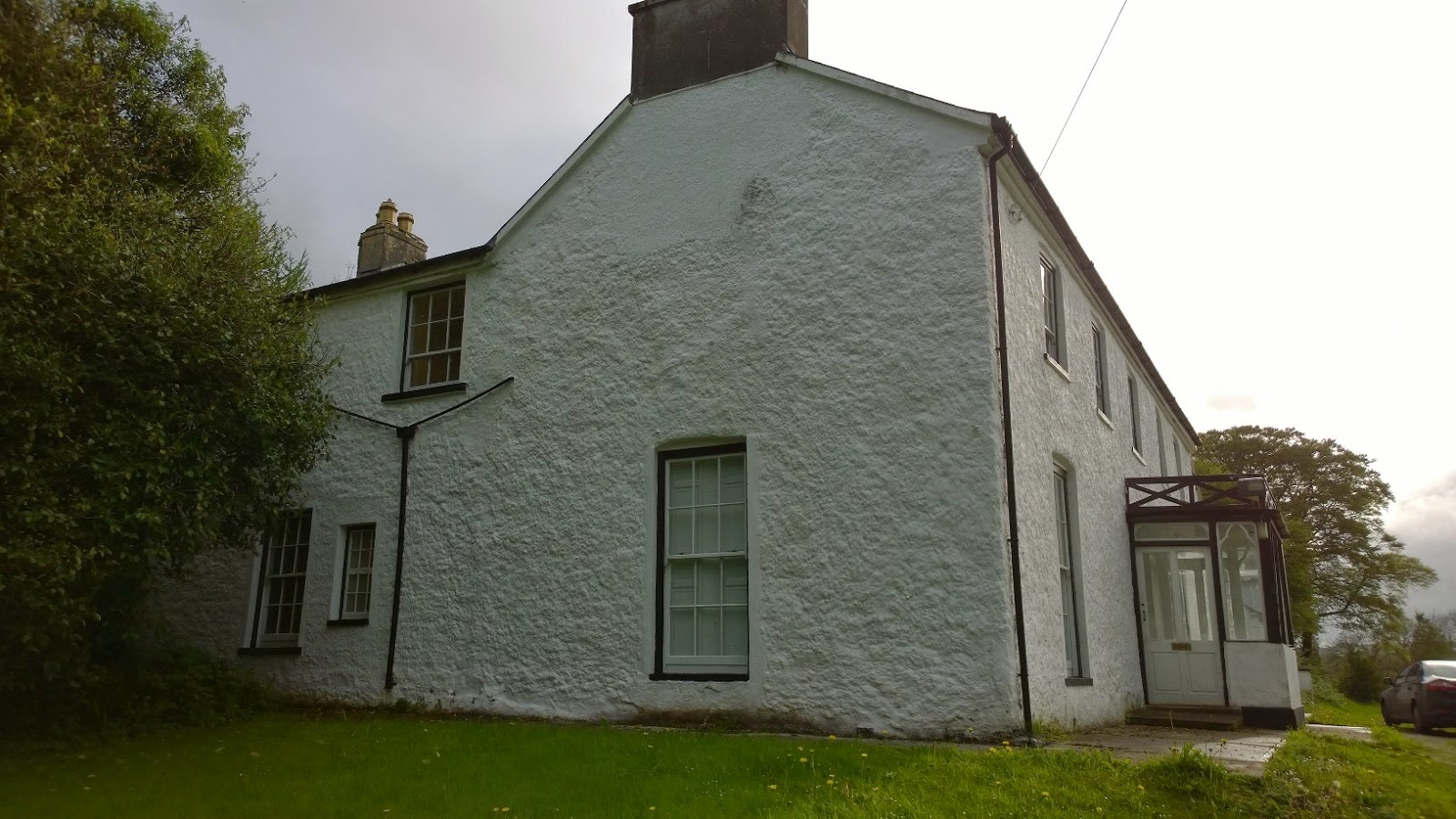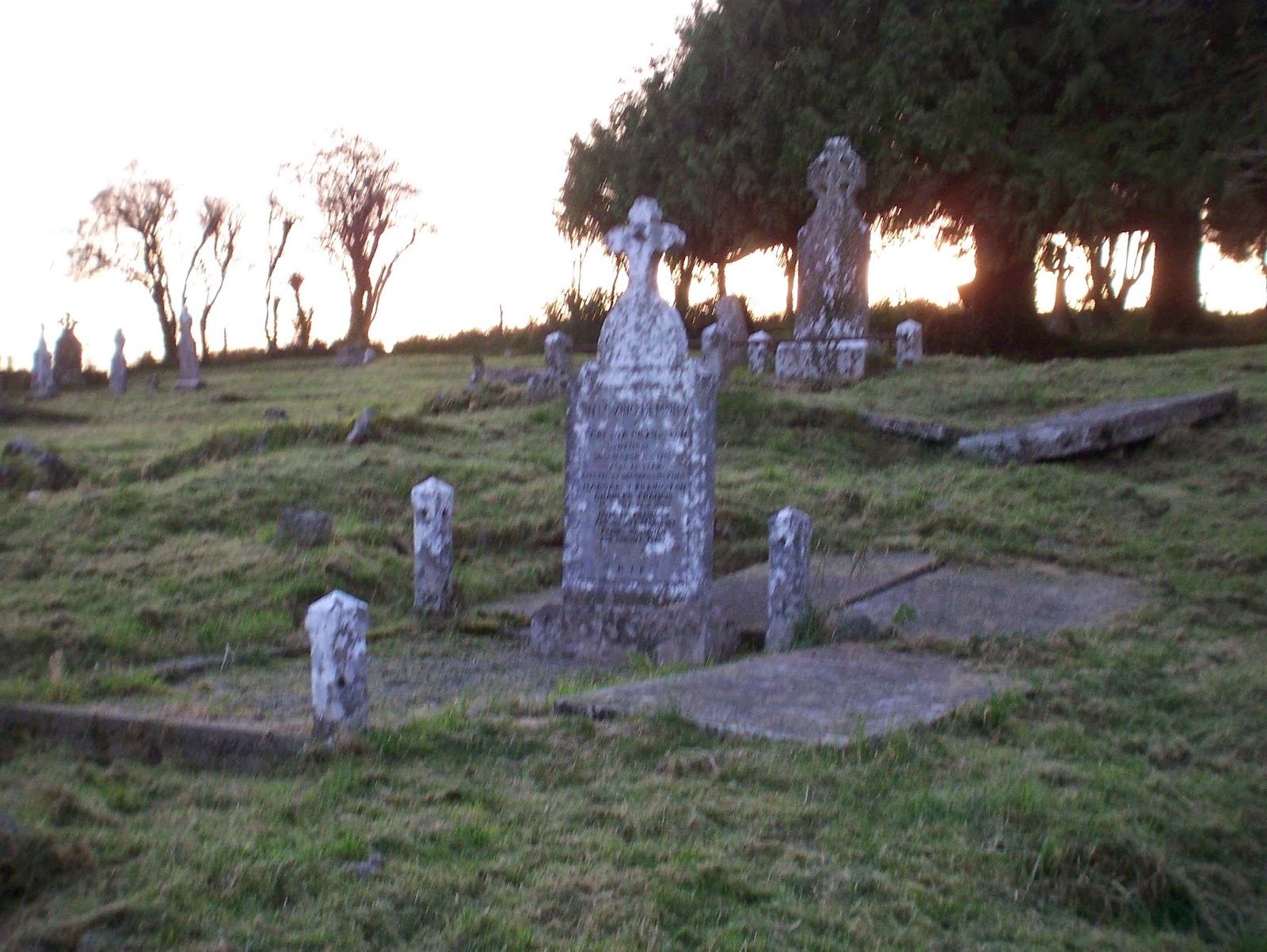We are fortunate to have a first-hand account of the Big Wind, written in her diary by my 3x great aunt Charlotte Keane. Charlotte lived a privileged life as a member of the landed gentry class. Her family home, Beech Park, near Ennis in county Clare is a ruin now, but would have been a grand home back in 1839. Hugh Weir, in his book "The Houses of Clare", describes Beech Park as a 2-storey building of 3 bays, situated on 17 acres of tree-scattered parkland.
There is a picture of Beechpark in better times in the Clare Library Foto collection.
At the time this event occurred, Charlotte's father, Robert Keane, was an invalid and confined to bed. She describes his concern for those exposed to the storm at sea, and his fear that the house would lose its roof. Robert Keane passed away 4 months after this, in May 1839. Charlotte's brother, Giles, was an Army Colonel serving in India. He died in 1867.
Here is Charlotte's account:
THE NIGHT OF THE BIG WIND
From the diary of Charlotte Keane
6th January 1839
Sunday,
wet day. No reading after Mamma had
prayers, settling news paper, an unprofitable and not happy Sabbath. After tea, the rain we had all day ended in a
high storm, and at 11 it blew indeed what the sailors call – a whole gale of
wind, and at 12 a terrific storm which continued without 10 minutes cessation
until 5 in the morning. It would be
useless to attempt description of that awful night outside doors. But the roar of the wind in the chimney in
the Parlour at 11 p.m, when Mamma left the room, frightened me so that I could
not remain alone. Robert, fortunately
being in the house, every means was tried to keep the house safe, and while he
and I were going from window to window, dear Pappa was sitting up in bed, and
constantly praying aloud for the poor creatures on the sea. Bob and I being the only two at home, we had
enough to do that night, the huge mattress of the front room bed he put in the
Lobby window, and settled Mary Duggan and Biddy supporting it with long
sweeping-brushes, but snug enough, they sat on the stairs. But no human being could be snug that night,
that heard it, and felt it, as we did at Beech Park.
The bed
stead of the middle room was put up to the window, and the feather bed pressing
between it and the shutters, but the girls room was the point of fury, I might
say the severest, being the south-west point, and from 12 until near 4 it blew
against that side of the house. So
violent was the storm, and fast the slates flying through the yard, that Robert
could not venture across the yard to call up John Conole who slept in the
laundry, though he twice attempted to do so, and help would have been
valuable. Fortunately Joe Armatage made
his way over from Coor for something to preserve Mr. Henry’s ricks of hay that
was disappearing fast, and I told him to come up to Pappa, and when upstairs
indeed we had little thought of telling him to go down again. Pappa’s getting a fright by the blowing in of
a window was now the chief thing to be apprehended, and guarded against. And it so happened that an hour after our
help came, the glass in the girl’s window was broke, and in burst the shutters,
sending the battons through the room like pins.
Robert immediately broke open Jane’s press, emptied its contents on the
bed, and putting it slanting towards the window, with the feather bed on top to
make it heavy, left Joe leaning against it, and wonderful to say, if he
attempted to take his weight off the press it was immediately pushed straight
up with the immense storm coming through one broken pane. What could we have done if he had not come
in? Pappa said several times if one of
the windows were blown in, the roof of the house would come off like a plate.
Oh, it
was a terrific night, how little I knew of the power of the air, or what a
storm was until that 6th of January.
At 4 o’clock it backed round to the north, and there blew for one hour
with unabated violence, straw and hay were peeling in under the back door and
carried up through the house.
But at
quarter to 5 it began to subside, though still blowing as it did until 8
o’clock. I went down at near 6 to
prepare tea and coffee for the poor servants, and everyone, and lay on the
small sofa by the parlour fire, --fatigued, and the one candle just out, when
there came such a sudden gust and mournful wind through the room, that I became
unhappy, and felt certain that at that moment some friend or friends were going
into Eternity. The clock struck 6 and
the melancholy strike spoke to my heart.
I came up and Pappa made me lie on their bed, and pretend to sleep, but
when I thought they were asleep, I stole away into my own room, and as Armatage
could leave the window since 5 and was only at the fire, I said he might go
away entirely and I went into my bed, -- It was just 7 o’clock, but I had not
lain down ten minutes, when I suppose the opening of the back door caused such
a rush of wind through the house, for such a gust passed through my room and
barred-up windows as I thought would send press, bed and all about the room,
and oh, the piercing wind that whistled through the keyhole, I jumped up
greatly frightened and pulled the bell, begging of them to send the man back
again to stay till clear day, and until I saw him sitting snug by the fire, I
could not compose myself to sleep.
And
then when we all got up at 10 the melancholy look the whole house had, everything
out of its place, the staircase covered with straw, however it came there, all
the windows blocked up in such a manner, and we left them so for another
forty-eight hours. John McGrath came out
the next day and told us all the mischief done in Ennis, but happily it was not
as much as might be expected. The
oldest inhabitants in the town of 70 and 90 years of age never remembered such
a storm, lasting for six hours before it lessened in the slightest degree. The old tree near Charley O’Connell’s house,
Arthurs Row, was taken up from the roots, I suppose some hundred years old, and
had stood out many and many a storm. 5
of the largest trees in Beech Park were torn up out of the ground. But what I saw when Pappa and I went to
Buncraggy a day or two after surprised me most.
Mr Jones took us into the garden and along one side of the grass walk
were 5 trees torn up by the roots, and all lying the same way, one after
another, as if the same terrific blast laid everything before it that moment
dead, and the two apple trees near each other also in another part of the
garden torn up. The appearance these 5
trees had -- lying so straight – almost like dead men on a field of battle,
they said before a cannon shot.
Until
that night I never thought a storm on land was to be dreaded, when in a
well-built strong house, and that Beech Park is, but the situation that night
was worse than any town house, being built on rather high ground, and so little
shelter from the trees in the west. It
was a night to be remembered, in which was seen the weakness of man, and man’s
power, when the Lord himself chooses to speak and to act.
And now
I will tell how they felt it in Dublin.
Maria was on a visit with Mrs. Griffin in Baggot street, at 11 o’clock
finding the storm so high they determined to remain up. After some hours they brought down the
feather beds to the drawing room, and settled themselves to rest as well as
they could, while the wind howled through the streets, and the slates were
flying in every direction. Maria fell
fast asleep, and in her sleep dreamed the Bishop of (? ) came to her bedside, and
told her her brother Giles was at sea in that dreadful storm.
 |
| Ruins of Beech Park 2014 |













